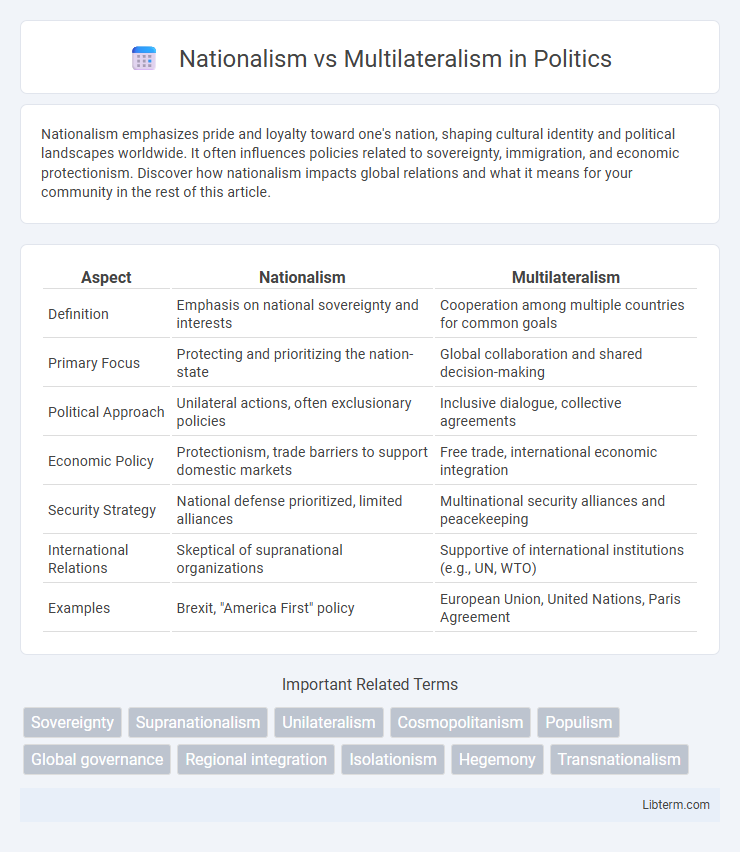Nationalism emphasizes pride and loyalty toward one's nation, shaping cultural identity and political landscapes worldwide. It often influences policies related to sovereignty, immigration, and economic protectionism. Discover how nationalism impacts global relations and what it means for your community in the rest of this article.
Table of Comparison
| Aspect | Nationalism | Multilateralism |
|---|---|---|
| Definition | Emphasis on national sovereignty and interests | Cooperation among multiple countries for common goals |
| Primary Focus | Protecting and prioritizing the nation-state | Global collaboration and shared decision-making |
| Political Approach | Unilateral actions, often exclusionary policies | Inclusive dialogue, collective agreements |
| Economic Policy | Protectionism, trade barriers to support domestic markets | Free trade, international economic integration |
| Security Strategy | National defense prioritized, limited alliances | Multinational security alliances and peacekeeping |
| International Relations | Skeptical of supranational organizations | Supportive of international institutions (e.g., UN, WTO) |
| Examples | Brexit, "America First" policy | European Union, United Nations, Paris Agreement |
Understanding Nationalism: Core Concepts
Nationalism centers on the prioritization of a nation's sovereignty, identity, and interests, emphasizing unity through shared culture, language, and history. It promotes self-determination and often advocates for policies that protect national borders and economic independence. Understanding these core concepts reveals how nationalism contrasts with multilateralism's focus on international cooperation and collective decision-making.
The Foundations of Multilateralism
Multilateralism is founded on principles of cooperation, mutual respect, and collective decision-making among sovereign states, emphasizing shared goals over unilateral actions. It relies on international institutions, treaties, and norms that facilitate dialogue and conflict resolution, promoting global stability and interdependence. This framework contrasts with nationalism by advocating for inclusive diplomacy and collaborative problem-solving to address transnational issues such as climate change, security, and economic development.
Historical Evolution of Nationalism
Nationalism emerged prominently in the late 18th and 19th centuries, driven by the French Revolution and the rise of nation-states emphasizing sovereignty and cultural identity. Its evolution influenced the decline of empires and colonialism, fostering movements for independence and self-determination across Europe and beyond. This historical trajectory set the stage for tensions with multilateralism, which advocates cooperative international relations and global governance frameworks.
The Rise of Multilateral Institutions
The rise of multilateral institutions such as the United Nations, World Trade Organization, and International Monetary Fund underscores a global shift toward cooperative governance and collective problem-solving. These institutions promote diplomatic engagement, economic integration, and conflict resolution among member states, counterbalancing nationalist tendencies focused on unilateral interests. By fostering shared norms and mutual accountability, multilateralism enhances global stability and addresses transnational challenges like climate change, pandemics, and security threats.
National Interest vs. Global Cooperation
Nationalism prioritizes protecting a country's sovereignty and advancing its national interest, often emphasizing economic self-sufficiency and border security. Multilateralism promotes global cooperation through institutions like the United Nations and World Trade Organization, aiming to address transnational challenges such as climate change, pandemics, and international conflict. Balancing national interest with global cooperation requires reconciling domestic priorities with collective action for sustainable development and security.
Economic Impacts: Protectionism and Free Trade
Nationalism often drives protectionism through tariffs, import quotas, and subsidies to shield domestic industries, leading to reduced global trade volumes and potential retaliatory measures. Multilateralism promotes free trade agreements and economic cooperation, enhancing market access, efficiency, and foreign investment flows among participating countries. While protectionism may safeguard short-term domestic jobs, free trade under multilateral frameworks typically fosters long-term economic growth and innovation by optimizing resource allocation.
Security Dilemmas: Unilateral Action vs. Collective Defense
Nationalism-driven unilateral action often intensifies security dilemmas by increasing mistrust and provoking arms races among states, undermining regional stability. Multilateralism promotes collective defense mechanisms, such as alliances and international institutions, which enhance transparency and reduce the incentive for preemptive aggression. Effective collective security arrangements mitigate the risks of conflict escalation by fostering cooperation and shared security responsibilities among nations.
The Role of Nationalism in Modern Politics
Nationalism in modern politics drives policies centered on national sovereignty, identity, and self-determination, often challenging the frameworks of multilateralism. It reinforces state-centric governance models, impacting international cooperation mechanisms within organizations like the United Nations and the European Union. The resurgence of nationalist movements influences trade agreements, immigration policies, and global diplomacy, emphasizing autonomous decision-making over collective action.
Challenges to Effective Multilateralism
Nationalism often undermines effective multilateralism by prioritizing sovereign interests and limiting cooperation among states, creating challenges such as reduced trust and fragmented global governance. Protectionist policies and unilateral actions driven by nationalist agendas hinder consensus-building and the implementation of international agreements. The tension between national sovereignty and collective action complicates addressing transnational issues like climate change, trade, and security within multilateral frameworks.
Future Prospects: Balancing Nationalism and Globalism
Future prospects for governance hinge on effectively balancing nationalism and multilateralism, as rising nationalist movements challenge global cooperation frameworks established by institutions like the United Nations and World Trade Organization. Embracing hybrid policies that reinforce national sovereignty while promoting international collaboration on climate change, security, and economic stability can foster resilient global systems. Advancements in diplomacy, technology, and transnational networks will play critical roles in harmonizing local identities with collective global interests.
Nationalism Infographic

 libterm.com
libterm.com